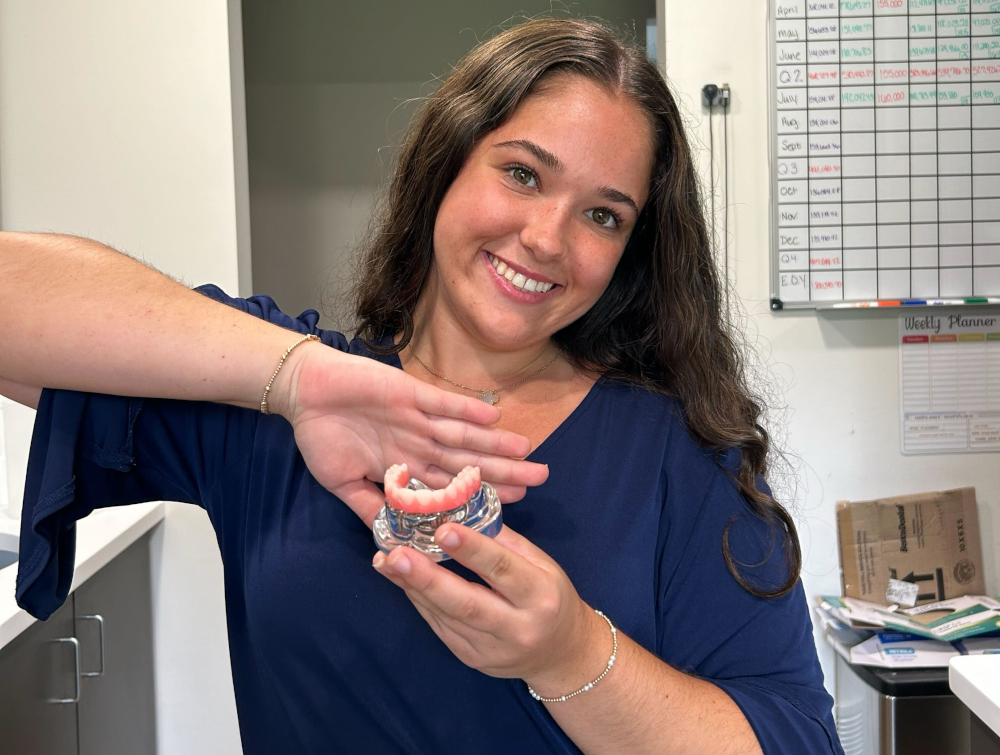Sciota, Pennsylvania
Does it seem your teeth are growing longer over time? Technically, our teeth don’t continue growing after they are fully developed, usually by 13 years of age. So while we may notice changes in our bite or tooth alignment with age, that is caused by changes in the gums, bones and jaw alignment — not the teeth themselves.
If you’re noticing a trend that your teeth seem to be longer than they once were, chances are high that what you’re noticing is actually gum recession, a condition that isn’t a positive sign for your oral health. Follow along on today’s blog as our family dentist in Sciota explains what gum recession is, how you can prevent it and what you can do about it if you notice it.
What is gum recession?
When the gum tissue that surrounds your teeth begins to pull back, it exposes more of the tooth and can even expose the tooth root, which can cause tooth sensitivity since it is more vulnerable to bacteria and temperature changes.
What can cause receding gums?
Your gums can begin receding for several reasons, including:
- Poor oral hygiene — If you aren’t brushing and flossing as recommended by our dentist and the American Dental Association, plaque can build up on the surfaces of your teeth, leading to tooth decay and gum disease.
- Gum disease — Gum disease is a bacterial infection that damages the soft tissue and bone that support the teeth. Gum disease, or periodontal disease, can cause the gums to deteriorate quickly. Our Sciota family dentist who specializes in gum care may take measurements of your gums to determine the extent of the recession.
- Brushing too hard — While many people believe that exerting a lot of pressure while brushing or using a hard-bristled toothbrush helps clean the teeth better, these things can actually scratch enamel on the teeth and wear down gum tissue.
- Bruxism — The clenching or grinding of teeth, known as bruxism, exerts extreme pressure on the teeth and can weaken the gums, contributing to their recession.
- Genes — Some families have a history of gum recession; if yours does, then you may be more prone to it, too.
- Tobacco use — Smoking or chewing tobacco can harm your gums and reduce their ability to heal.
What problems can receding gums cause?
Gum recession can lead to longer-appearing teeth and significant oral health issues, including:
- Increased tooth sensitivity — Exposed tooth roots are sensitive to hot, cold or sweet foods and drinks.
- Risk of decay — Exposed areas of a tooth caused by gum recession are more susceptible to develop cavities.
- Tooth loss — Advanced gum recession can weaken the support for your teeth, increasing the risk of tooth loss.
Can I prevent gum recession?
You can prevent your gums from receding by brushing your teeth twice a day with a soft-bristled toothbrush and flossing once daily. You can boost your oral health care regimen by using an antimicrobial oral rinse once or twice a day. Visits twice a year to our family dentist’s office in Sciota for routine checkups and cleanings are also a necessary part of your oral health regimen.
How can I treat gum recession if I have it?
Unfortunately, dentists don’t have a way to reverse gum recession, but you can take steps to stop the recession by implementing the following tips:
- Improve your oral hygiene — Using a soft-bristled toothbrush and a non-abrasive fluoride toothpaste, brush the surface of your teeth gently in circular motions twice a day. Be sure to floss daily, too.
- Address bruxism — If you grind your teeth at night, our dental team can custom-create a nightguard for you to wear to protect your teeth and gums from the pressure that bruxism exerts on them.
- Treat gum disease promptly — If you have gingivitis, which is the beginning stage of gum disease identified by red, swollen, bleeding gums, be sure to talk to our Sciota dentist. An improved oral health regimen is usually enough to reverse gingivitis. But if gum disease advances to a more serious level and becomes periodontitis, we may need to schedule a treatment like deep cleaning (scaling and root planing) or antibiotics.
- Gum grafting — In severe cases, a gum grafting procedure can restore the gum tissue around your teeth, improving both function and appearance.
Gum health in Sciota, PA
If you have noticed that your gums are beginning to recede, reach out to us at Quiet Valley Dental. From preventive measures to advanced treatments, we’re here to support your oral health every step of the way. Call us at (570) 865-7850 or contact us online to book your appointment today.






